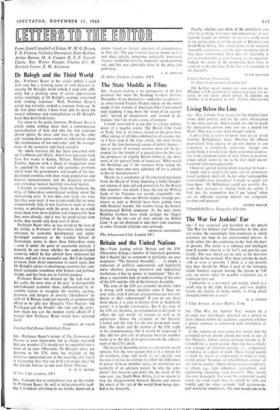Dr Balogh and the Third World
X l Dram
From: Lord Campbell of Eskan, W. M. G. Brown, F. R. Finston, Nicholas Davenport, Peter Kellner, Arthur Barton, M. A. Cooper, R. T. F. Turrall- Clarke, Rev. Walter Hooper, Charles Gill, W. Horsfall Carter, E. W. Swelman.
SIR,—Professor Bauer in his article (which I read with ease but a growing sense of cold distaste) re- viewing Dr Balogh's book (which I read with diffi- culty but a growing sense of warm appreciation) writes sneeringly of Dr Balogh's seeming `concerned with evoking responses.' Well, Professor Bauer's article has certainly evoked a response from me. In the first place where I have been able to check his textual references and contradictions to Dr Balogh's book they don't hold water.
Far more to the point, however, Professor Bauer's article seems nothing more than a contemptuous rationalisation of how and why the rich countries should ignore the poor, and 'pass by on the other side' (tossing them some crumbs of exhortation about 'the maintenance of law and order' and 'the manage- ment of the monetary and fiscal system').
My whole business life has been concerned with the Caribbean and Africa. And I have just come back from five weeks in Kenya, Malawi, Mauritius and Zambia. Anyone with a shred of imagination must be appalled by the social and economic problems which beset the governments and people of the less- developed countries with their rising populations and hideous unemployment, and the desperate poverty and individual human hardship involved therein.
I shudder at remembering, from my boyhood, the relics of Edwardian conventional wisdom about the undeserving poor. It was their own fault, not ours, that they were poor; it was to our credit that we were comparatively rich; it was feckless to want to share money or privileges with the poor; to do so would make them even more feckless and irresponsible than they were already; and it was `no good giving them baths, they would only keep coal in them.'
Professor Bauer who, as you stated at the foot of his article, is Professor of Economics (with special reference to economic development and under- developed countries) at the London School of Economics, seems to share these Edwardian views —even if under the guise of reasonable analysis. I honestly do not know whether the underdeveloped countries which he has advised have welcomed his advice, and put it to successful use. But I do happen to know, from direct experience in recent years, that Dr Balogh's advice to developing countries has com- bined economic soundness with human and political insight, and has been put to fruitful purpose.
Professor Bauer has dressed up 'the rich man in his castle, the poor man at his gate' in disreputably old-fashioned academic dress, subfusculated by in- credible failure to recognise the realities, agonies, pressures and dangers of poverty ('detachment' he calls it). If Britain could not morally or economically afford to be split into Disraeli's Two Nations—the Privileged and the People'—the rich and the poor: how much less can the modern world afford it? I wonder how Professor Bauer would have reviewed Sybil.
CAMPBELL OF ESKAN
Crocker End House, Nettlebed, Oxon






































 Previous page
Previous page